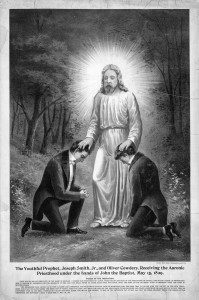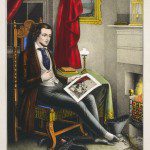
When criticisms are generally made against the Church of Jesus Christ of Latter-day Saints, there are always two that never seem to go away. The first is the issue of polygamy; the other is black people and the priesthood. This is not much of a surprise, as people are often more interested in the controversial and the negative, rather than what the church and it’s doctrines really teach.
In response to this, in 2013 the church released an article entitled “Race and the Priesthood”. No one is exactly sure who wrote the article, as no name is on it. All that is known is that is linked to the churches official website, so the brethren have approved it. It basically rehashes the same history that anyone familiar with this issue already knows: Joseph Smith ordained blacks and allowed them to be ordained, during Brigham Young’s presidency blacks stopped being ordained (for reasons no one is sure of), in 1978 a revelation came allowing black men to receive the priesthood and temple blessings, and finally that the church condemns racism past and present.
There are several problems with this article. The first is that the article does not say whether the practice of racial restriction was right or wrong; it merely states that it started under Brigham Young. It is surprising because this is really the only question left with this issue, was it right or wrong? And there really is no way to be neutral about this: Either the Lord commanded Brigham Young and others to restrict blacks from holding the priesthood, or faithful, deserving people were denied the greatest blessings available to men in mortality for prejudicial reasons. It really is that simple.
It may seem to some that I am committing the fallacy of a false dichotomy; reducing things down to only two options. However, this is a time when this is a true possibility. Leaders for many decades believed that such had happened, and told church members that the reason for the restriction was based upon revealed truth. Therefore, it is leaders who have given us two options.
Considering that Brigham Young never said he received revelation to institute the practice, we will assume that such was not the case. None of the early brethren said that was the case, and Joseph F. Smith argued against the idea often as an apostle. The reasons for the restriction under Brigham Young were stated by himself when he said “You see some classes of the human family that are black, uncouth, uncomely, disagreeable and low in their habits, wild, and seemingly deprived of nearly all the blessings of the intelligence that is generally bestowed upon mankind….Cain slew his brother. Cain might have been killed, and that would have put a termination to that line of human beings. This was not to be, and the Lord put a mark upon him, which is the flat nose and black skin[1].” He then remarked that Cain’s descendants could not hold the priesthood. This idea in reality was not Mormon, it was a continuation of a protestant belief that Young and the early leaders would have heard about being Protestants themselves before converting. A perfect example of mixing the gospel with the philosophies of men.
The article points this out but also says that Brigham Young also said the day would come when blacks would receive all the blessings available to others. However they don’t use the full quote. It goes thus “How long is that race to endure the dreadful curse that is upon them? That curse will remain upon them, and they never can hold the Priesthood or share in it until all the other descendants of Adam have received the promises and enjoyed the blessings of the Priesthood and the keys thereof. Until the last ones of the residue of Adam’s children are brought up to that favorable position, the children of Cain cannot receive the first ordinances of the Priesthood. They were the first that were cursed, and they will be the last from whom the curse will be removed. When the residue of the family of Adam come up and receive their blessings, then the curse will be removed from the seed of Cain,and they will receive blessings in like proportion.”[2]
In this discourse President Young was talking about Abel, the son of Adam who Cain slew. He said until Abel was resurrected and had posterity who enjoyed the blessings of the priesthood, blacks would never hold it. The problem is simple: Abel has not done that, and yet blacks hold the priesthood. Clearly Mr. Young was in error. He also said that if the church gave priesthood to blacks before this time, the church would lose all priesthood.
So, we have two options: Brigham was right, or we no longer have priesthood. If we don’t, we need to get all of our missionaries out of the field because neither they nor us have the authority to baptize and have it recognized by deity. Of course, we all know that cannot be the case, but for some reason the article does not condemn Brigham Young for preaching something that was clearly false and having generations today still believe it.
And Brigham was not the only president of the church who thought that the priesthood ban was inspired. In an official statement made in general conference President George Albert Smith said, “The attitude of the Church with reference to the Negroes remains as it has always stood. It is not a matter of the declaration of a policy but of direct commandment from the Lord, on which is founded the doctrine of the Church from the days of its organization, to the effect that Negroes may become members of the Church but that they are not entitled to the Priesthood at the present time. The prophets of the Lord have made several statements as to the operation of the principle. President Brigham Young said: “Why are so many of the inhabitants of the earth cursed with a skin of blackness? It comes in consequence of their fathers rejecting the power of the holy priesthood, and the law of God. They will go down to death. And when all the rest of the children have received their blessings in the holy priesthood, then that curse will be removed from the seed of Cain, and they will then come up and possess the priesthood, and receive all the blessings which we now are entitled to.”[3]
David O. McKay complicated matters further when he said that the practice was policy, and not doctrine. McKay was a counselor to President Smith when the former declaration came, so apparently there was not unity in the belief, which is a very scary thought for the first presidency to not be in unity on such an important issue.
For some reason, the church still tries to remain neutral (which it accused blacks of being in pre-mortality) on this issue rather than just doing the right thing of saying that the practice was immoral and wrong. Perhaps that reason is because of a belief that a prophet can never lead the church astray, which is something that Joseph Smith said could happen more than once. For more on that, I refer the reader to Ezekiel 14
I am not sure what the point of this article was for. It didn’t answer any questions; it just gave new life to the old ones. Perhaps some white people will feel better about what was written, but this will not help blacks come into the church. What needs to happen is simple: The President of the church should give an official apology, renounce the false claims that were made, and let it go to rest. Until then, the problem is still here.
I would like to say however, that this does not excuse any black person from joining the church. It is true that past leaders were racist and prejudiced, but that does not make their message false. Regardless of what happened, God still lives, Jesus is still the Christ, Joseph Smith was still a mighty and great prophet, the Book of Mormon is still true, the Church of Jesus Christ of Latter-day Saints is still what it proposes itself to be, and you still need to join it to be truly happy in this life and in the life to come. All the blessings of heaven are open to you; don’t reject them because of past mistakes. Of this I bear witness.
.[1] Journal of Discourses
[2] Journal Of Discourses 7:282
[3] Mormon America. pp. 101–102.












